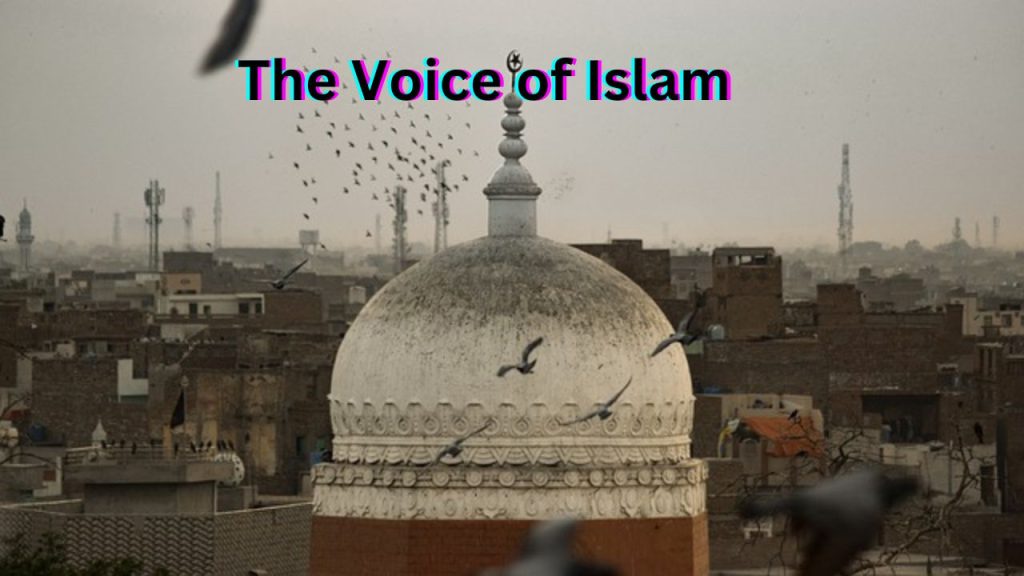Discover the true voice of Islam is a message of peace, unity, and compassion. Learn how Islamic teachings offer spiritual growth, promote social justice, and foster a harmonious community. Explore the practical benefits of Islam’s guidance for individuals and society in today’s world.
The Voice of Islam
In today’s globe, when many different religions, cultures, and customs coexist, Islam’s voice serves as a beacon of harmony, wisdom, and peace. Islam, which is sometimes misinterpreted, is a whole way of life that encourages empathy, moral principles, and understanding. This essay will examine the fundamental principles upheld by Islam, debunking popular misconceptions and highlighting its benefits for both people and societies.
Let’s examine the core ideas of Islam, comprehend its tenets, and see how its message still has resonance today, providing insight and direction for contemporary living.
1. Understanding the Voice of Islam
Islam’s voice is fundamentally one of peace. Indeed, the Arabic word “Salaam,” which signifies peace, is the root of the word “Islam” itself. The fundamental tenet of Islamic teachings—promoting harmony with oneself, others, and the Creator—is embodied in one potent term. Islam encourages its adherents to respect everyone, live in harmony, and practice charity.
Islam’s voice is both pragmatic and spiritual. It gives Muslims advice on many facets of life, from how to treat family members with dignity and compassion to how to handle business in an ethical manner. Believers are encouraged by its teachings to concentrate on improving oneself and making constructive contributions to society.
2. The Power of Community: Unity in Diversity

One of the most important aspects of Islam is its feeling of community, or “Ummah.” According to Islamic doctrine, every believer is a member of a single, faith-based family. This solidarity fosters a worldwide community that upholds justice and solidarity across racial, national, and socioeconomic divides.
Islam’s emphasis on community, whether it is via regular prayers, mosque attendance, or charitable giving, serves to unite individuals. Muslims from throughout the world, for instance, fast, pray, and encourage one another during Ramadan. Muslims are reminded of the value of compassion for others, particularly the least disadvantaged, and a sense of solidarity is fostered by this shared experience.
3. The Spiritual Benefits of Islam

Islam’s message exhorts its adherents to live a life of humility and honesty, emphasizing self-control and spiritual development. The following are some ways that believers gain from Islam’s teachings:
a. Prayer as a Daily Connection
A key component of Islam, the five daily prayers, or “Salah,” provide a means for Muslims to communicate with God. Muslims benefit from this regular period of introspection by staying centered, finding inner peace, and remembering their mission. It’s an opportunity to concentrate, reset, and realign with ideals of faith, patience, and thankfulness.
b. Charity as a Duty: Zakat
In Islam, charitable giving to others is highly valued. Muslims are required under the “Zakat” idea to donate a percentage of their money to those in need. By encouraging Christians to see beyond their personal needs, this practice fosters a sense of societal responsibility and charity.
4. The Pursuit of Knowledge
Islam’s voice has consistently supported the quest for intellectual and spiritual enlightenment. According to a quote from the Prophet Muhammad (peace be upon him), “Seek knowledge from the cradle to the grave.” This lesson emphasizes Islam’s value of education, inquiry, and development. Islam’s promotion of education served as inspiration for many of the early scientific, mathematical, and philosophical discoveries made by Muslim thinkers.
a. Contributions to Science and Medicine
Islamic culture made significant historical contributions to disciplines including literature, mathematics, astronomy, and medicine. The world is still affected by the discoveries made by academics like Ibn Sina in philosophy, Al-Razi in medicine, and Al-Khwarizmi in mathematics. Islam’s message emphasizes the balance between religion and reason and exhorts adherents to investigate, comprehend, and better the world.
b. The Value of Critical Thinking
Muslims are encouraged to think, consider, and ask questions by the Qur’an itself. Islam fosters critical thinking, which advances the intellectual and spiritual development of its adherents. Islam’s emphasis on education has inspired its adherents to travel the world while maintaining a moral and ethical foundation.
5. Encouraging Equality and Justice
In Islam, justice is a fundamental principle. Islam’s voice promotes justice and denounces corruption, prejudice, and tyranny. Islam emphasizes that everyone deserves respect and decency, regardless of their origins. This dedication to justice guarantees that believers work to improve society.
a. Gender Equality in Islam
Although there are many misconceptions regarding Islam’s gender position, the truth is that Islam granted women’s rights far earlier than many other societies. The Qur’an places a strong emphasis on women’s rights and respect, especially the rights to inheritance, property, and education. It promotes courteous, well-balanced interactions between men and women.
b. Human Rights and Social Justice
Islam places a strong emphasis on upholding moral principles, speaking out against injustice, and helping the downtrodden. Muslims are urged to take up social justice causes in order to build a society that is more just and caring.
6. Practical Benefits in Daily Life
Islam provides helpful advice for leading a balanced and satisfying life in addition to its spiritual and social ideals. Among these advantages are:
a. Mental Wellness and Health

Islam’s teachings offer consolation in trying times by lowering tension and anxiety. It has been demonstrated that techniques like prayer, mindfulness, and thankfulness improve mental health. The Qur’an offers consolation and fortitude in times of adversity by reminding Muslims to “be patient and steadfast.”
b. Healthy Lifestyle and Hygiene
Islam promotes hygiene and a healthy lifestyle. For instance, food regulations encourage thoughtful eating practices, while the ablution (Wudu) ritual performed prior to prayers stresses cleanliness. The ban on drugs and alcohol encourages a better way of living and protects Muslims from the negative consequences of addiction.
7. The Voice of Harmony and Harmony
Contrary to popular belief, Islam advocates for harmony and peaceful coexistence. The Qur’an encourages amicable relations with all groups and preaches respect for those of different faiths. Islam’s tenets of compassion and respect for one another are in line with human values that are universal.
a. Building Bridges of Understanding
Building bridges with people of different faiths is something that Islam encourages its adherents to do in an increasingly globalized world. Islam’s voice opposes bigotry and promotes civil discourse and comprehension. This cooperative attitude can lessen miscommunications, discrimination, and division.
c. Illustrations of Interfaith Unity
In communities across the world, a large number of Muslims and non-Muslims collaborate to promote issues including education, environmental preservation, and poverty alleviation. Islam’s genuine voice—one of love, compassion, and cooperation—is reflected in these collaborative endeavors.
8. The Rewards of Faith and Devotion
Islam assures those who seek it of tranquility and meaning. For societal influence, personal progress, and spiritual development, its teachings offer a framework. Those who choose to follow Islam find great fulfillment in its voice, which offers them a sense of direction, moral guidance, and the chance to make a difference in the world.
Conclusion: Islam’s Voice in a Modern World
Islam’s message is still relevant in today’s world because it provides social, spiritual, and practical advantages that may enhance both individual lives and society at large. Its beliefs encourage unity, justice, knowledge, harmony, and peace. Islam’s principles remain ageless, whether they are promoted by promoting education, compassion, or a feeling of community.
Islam’s core principles are universal and appeal to individuals from all areas of life, despite the fact that they are sometimes misinterpreted. Everyone is invited by the voice of Islam to comprehend its message, see past misunderstandings, and value its emphasis on harmony, peace, and progress—Muslims and non-Muslims alike.
These values provide Muslims with a means of finding contentment, living a purposeful life, and helping others. Others believe that hearing the voice of Islam helps promote empathy, respect for one another, and a more peaceful society. Islam continues to lead, uplift, and unite in this way, providing a route of peace and prosperity for all people.




